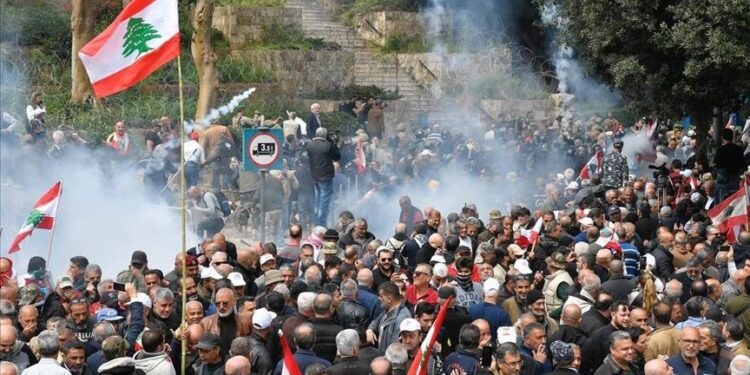Lebanon, once known as the “Switzerland of the Middle East,” is currently facing one of the most severe economic crises in its history. The nation in crisis has been grappling with a financial meltdown that became fully apparent in August 2019 and has since spiraled into a multifaceted disaster affecting every aspect of life for its citizens. This article delves into the causes, consequences, and ongoing challenges of Lebanon’s economic crisis, shedding light on how a formerly prosperous country has found itself in such dire straits.
Lebanon’s current economic woes can be traced back to its post-civil war economic model. Since 1997, the Lebanese lira had been pegged to the US dollar at a fixed rate of 1,507.5 to 1. This currency peg was meant to bring stability to the country after the severe devaluation following the Lebanese Civil War (1975-1990). However, maintaining this peg required a constant inflow of foreign currency, which Lebanon achieved through various means such as tourism, real estate investments, remittances from the diaspora, and a financial sector that offered high interest rates and banking secrecy.
This economic model began to show cracks as early as 2016 when Lebanon experienced a slowdown in foreign currency inflows. The central bank responded with a series of financial engineering operations, known as “the swap,” which temporarily averted a liquidity crisis but significantly increased the country’s public debt in dollars. These operations, while providing short-term relief, ultimately proved unsustainable and set the stage for the current crisis.
The Unraveling of the Lebanese Economy
The full extent of Lebanon’s economic fragility became apparent in late 2019. As foreign currency inflows continued to decline, the black market exchange rate began to diverge from the official rate. The situation was exacerbated by the outbreak of the COVID-19 pandemic, the devastating Beirut port explosion in 2020, and the global economic impact of the Russian invasion of Ukraine.
The consequences of this economic unraveling have been severe:
1. Currency Devaluation: The Lebanese lira has lost over 90% of its value against the US dollar.
2. Hyperinflation: The country is experiencing triple-digit inflation, with basic goods becoming unaffordable for many.
3. Banking Crisis: Commercial banks have imposed strict capital controls, preventing depositors from accessing their savings.
4. Public Service Collapse: Essential services like electricity and water have become unreliable, with power outages lasting up to 23 hours a day in some areas.
The Human Cost of the Crisis
The economic collapse has had a devastating impact on the Lebanese population. An estimated 80% of the country’s seven million inhabitants now live below the poverty line. The crisis has led to widespread shortages of essential goods, including fuel, medicine, and basic foodstuffs. Many families are struggling to meet their basic needs, with some parents resorting to sending their children to orphanages due to inability to provide for them.
The healthcare system has been particularly hard hit, with hospitals struggling to maintain operations amid fuel shortages and lack of medical supplies. The education sector is also under strain, with many schools and universities facing closure or severe budget cuts.
The banking crisis has added another layer of hardship, as many Lebanese find themselves unable to access their life savings. This has led to a series of desperate acts, including armed bank robberies by depositors attempting to withdraw their own money. These “bank robbers” have been described as folk heroes by some, highlighting the depth of public frustration with the financial system.
Looking Ahead: Challenges and Potential Solutions
As Lebanon grapples with this unprecedented crisis, the path to recovery remains uncertain. The World Bank has warned that without significant reforms, this could become one of the three most severe crises globally since the mid-19th century. Key challenges include:
1. Political Instability: The crisis has sparked political unrest, including the 17 October Revolution in 2019, which led to the resignation of Prime Minister Saad Hariri. Ongoing political deadlock has hindered efforts to implement necessary reforms.
2. Structural Reforms: Lebanon needs to undertake comprehensive reforms of its economic and financial systems, including restructuring the banking sector and addressing corruption.
3. International Support: While Lebanon has received humanitarian aid from various countries and organizations, securing long-term financial support will likely require a commitment to reforms and increased transparency.
4. Rebuilding Trust: Restoring confidence in the Lebanese financial system and government institutions will be crucial for attracting foreign investment and rebuilding the economy.
Lebanon’s ongoing crisis represents a stark reminder of how quickly economic mismanagement and external shocks can destabilize a nation. As this nation in crisis continues to navigate through these turbulent times, the resilience of the Lebanese people is being tested like never before. The road to recovery will be long and challenging, requiring not only economic reforms but also political stability and international support. The world watches as Lebanon struggles to overcome this crisis and rebuild its once-prosperous economy.
Related News
















